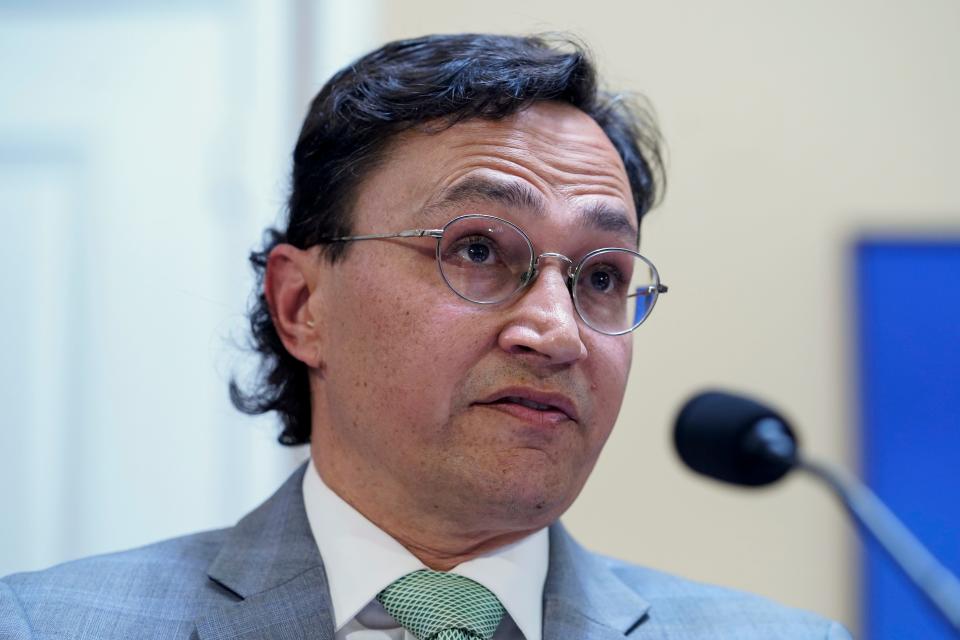Congress is finished for the year, without voting on a Cherokee Nation delegate
Congress ended the year without seating a Cherokee Nation delegate, extending the tribe’s generations-long wait for representation in the U.S. House.
And it could be awhile before lawmakers take up the 1835 treaty promise again. Republicans, who have voiced concerns about the process to seat a delegate, take control of the House in 2023.
“We’ve waited nearly two centuries,” Cherokee Principal Chief Chuck Hoskin Jr. said. “We’re not going to let the clock striking midnight at the end of the session slow us down one bit.”
Cherokee chief:Our ancestors were promised a delegate in the House. Treaties matter.

U.S. officials pledged Cherokee people a voice in Congress in exchange for ceding their Southeastern homelands and moving west on the Trail of Tears. Today, the Cherokee Nation is based in Oklahoma and has more than 440,000 citizens, a population base larger than Tulsa.
Oklahoma ranked poorly in a recent Forbes list. Is it really that bad?
Hoskin helped revive the push for a Cherokee House delegate in 2019. The campaign reached its biggest stage in November when the House Rules committee held a hearing on the matter. If seated, the tribe’s delegate could introduce bills and serve on committees, but not cast final votes on legislation.
Cherokee leaders had hoped that after the Rules Committee hearing, House lawmakers would consider changing the chamber’s rules to add a Cherokee delegate. Although some top Democrats expressed support for a delegate, a vote to change the rules never made it to the House floor.
At a Rules Committee hearing on Thursday, Chairman Jim McGovern, D-Mass., pledged to continue working next year to seat a Cherokee delegate. "Though a complicated issue, I personally believe that we need to find a way to honor our treaty obligations with the Cherokee and seat a delegate in the House," he said.
McGovern also thanked Oklahoma Rep. Tom Cole, the leading Republican on the committee, for trying to find a path forward on the matter. Cole responded by saying he would keep working with McGovern on the Cherokee delegate issue.
The Cherokee Nation has always worked to build bipartisan support in Congress and won't slow down its push to send a tribal delegate to Washington, D.C., Hoskin said.
Will Republican-controlled House make it harder to seat Cherokee delegate?
But tribal leaders may face a steeper climb. Cole said in a Dec. 5 interview that he believes the House is less likely to seat a Cherokee delegate under Republican control. “But not impossible,” he said.
He and other Republican lawmakers have raised several procedural questions that could become hurdles for Cherokee leaders to navigate. Cole said lawmakers would need to draft a bill to be vetted through the traditional committee process. “Until somebody actually submits a bill, it’s a theoretical discussion,” he said.
Holiday movies: New Nativity video features Mvskoke language
Hoskin and other Cherokee leaders do not believe a bill is necessary, only an addition to the House rules to account for a new delegate. The Senate already has signed off by ratifying the 1835 Treaty of New Echota, which granted the Cherokee delegate right.
“However, I’ve always been respectful of the Congress as an institution, and we’ll pursue whatever path is best to get us to our goal, which is fulfillment of the treaty obligations,” Hoskin said.
Other tribal nations also may have treaty rights to a congressional delegate, which makes the issue more complex for lawmakers, said Cole, who is a citizen of the Chickasaw Nation. “That’s one of the arguments: If we start one, are we opening up a can of worms?” he asked.
The handful of tribes that have raised their hands so far include the related United Keetoowah Band of Cherokee Indians in Oklahoma and the Eastern Band of Cherokee Indians in North Carolina. The Choctaw and Delaware nations in Oklahoma also have pointed to their treaty delegate rights.
Tribes are pursuing mobile gaming. Will that open the door to sports betting in Oklahoma?
Delaware Nation President Deborah Dotson wrote in a Dec. 15 op-ed in The Oklahoman that it’s important for Congress to act on all treaties. “The Delaware Nation does not support seating the Cherokee Nation’s delegate, unless Congress seats our Delaware delegate first,” Dotson said.
Hoskin said the Cherokee Nation has received support from the powerful National Congress of American Indians and isn’t trying to block other tribes from asserting treaty rights. He does believe only the Cherokee Nation, and not its two relatives, is the sole party to the Treaty of New Echota, which they dispute.
All the treaties date back to the 1800s, and to 1778 in the case of the Delaware Nation. But Congress has never appointed any of the tribal delegates.
The six non-voting members that currently serve in the House represent American Samoa, the District of Columbia, Guam, the Commonwealth of the Northern Mariana Islands, Puerto Rico and the U.S. Virgin Islands.
Cherokee leaders have appointed citizen Kim Teehee, a former White House tribal affairs adviser, to serve as the nation’s delegate if the House moves forward to seat one. Hoskin believes a delegate is a matter of when, not if.
“I feel like we’ve got a great foundation,” Hoskin said. “Obviously, we’ll need to continue to develop relationships as we see the new leadership that emerges in Congress.”
Contributing: Staff writer Chris Casteel
Molly Young covers Indigenous affairs for the USA Today Network's Sunbelt Region. Reach her at mollyyoung@gannett.com or 405-347-3534.
This article originally appeared on Oklahoman: Push for Cherokee Nation delegate will shift to Republican-led House

